CW1 Essay: Co-evolving Relationship Between Citizenship & Welfare
VerifiedAdded on 2023/06/16
|10
|3144
|358
Essay
AI Summary
This essay critically analyzes the co-evolving relationship between citizenship and welfare provisions, focusing on the domain of education in the UK. It explores the historical context, key issues such as teacher shortages and attainment gaps, and the role of government initiatives. The essay delves into social risks within education, including status and protective risks, and examines the concept of educational welfare services. It also discusses the National Curriculum as a social policy and its impact on uniformity and standards. Furthermore, the essay incorporates theoretical perspectives such as Modernity Theory and Marshall Citizenship Theory to understand the rights and duties of citizens in relation to education. Finally, it discusses the role of welfare provisions like Public Assistance in creating a well-educated citizenry and addresses the significance of a welfare state in promoting economic and social health through education.
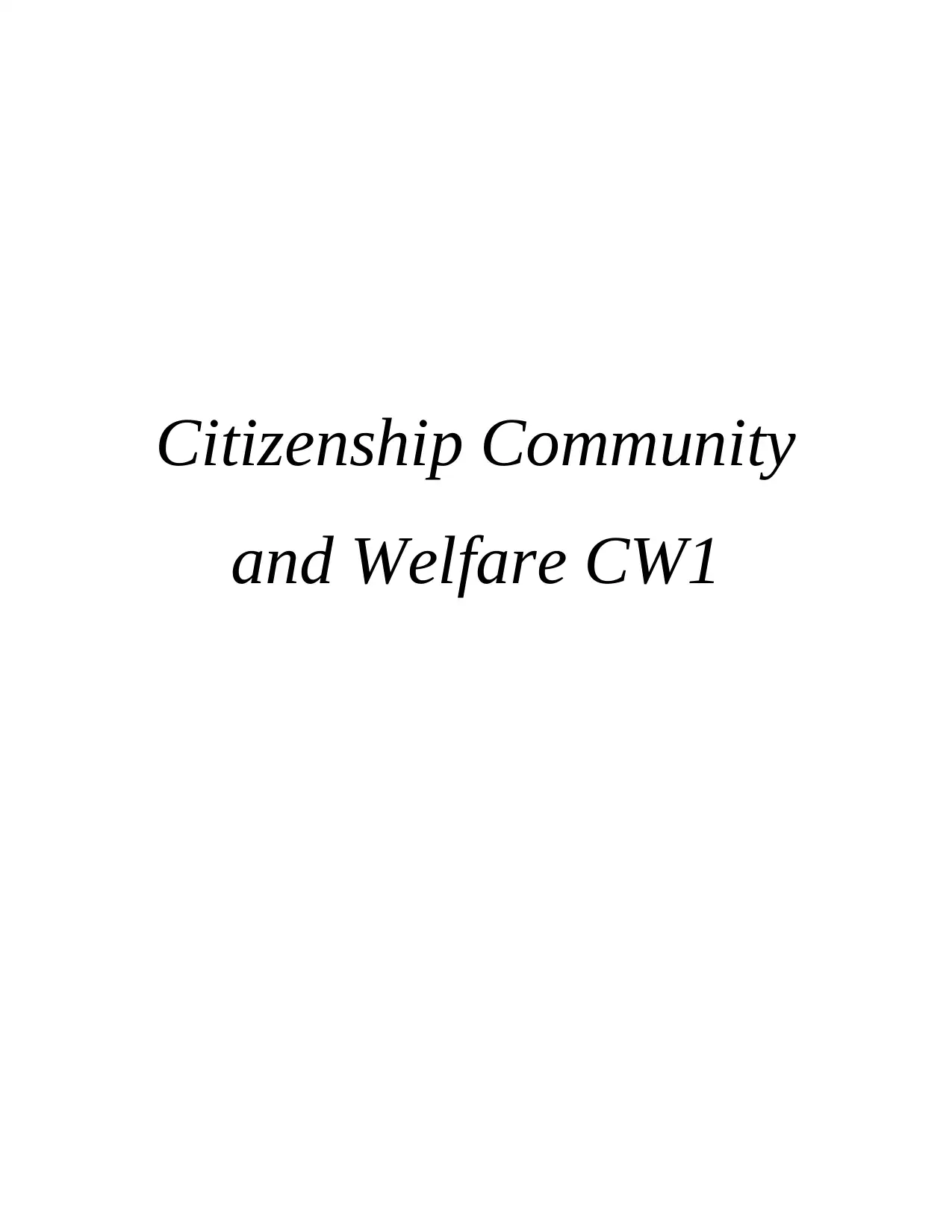
Citizenship Community
and Welfare CW1
and Welfare CW1
Paraphrase This Document
Need a fresh take? Get an instant paraphrase of this document with our AI Paraphraser
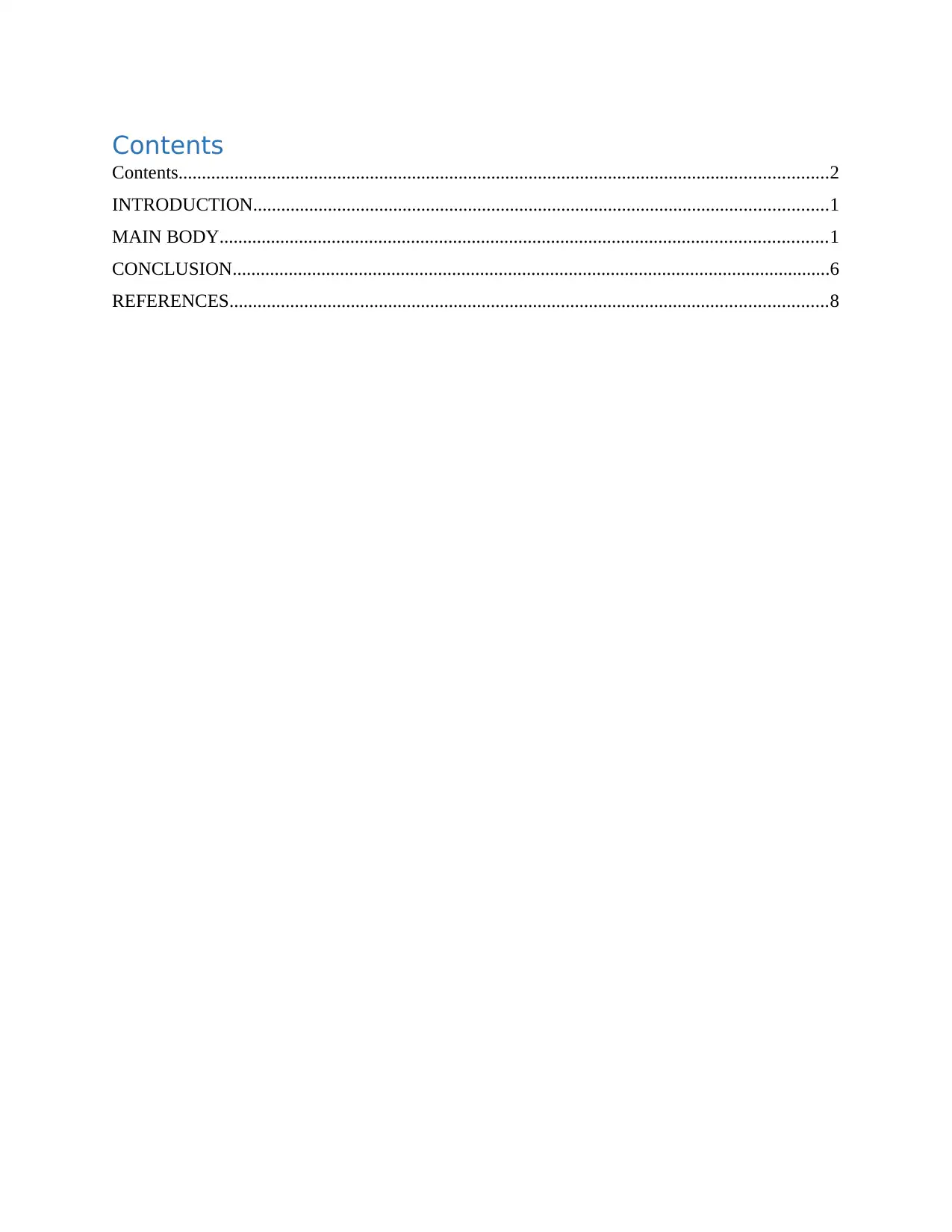
Contents
Contents...........................................................................................................................................2
INTRODUCTION...........................................................................................................................1
MAIN BODY..................................................................................................................................1
CONCLUSION................................................................................................................................6
REFERENCES................................................................................................................................8
Contents...........................................................................................................................................2
INTRODUCTION...........................................................................................................................1
MAIN BODY..................................................................................................................................1
CONCLUSION................................................................................................................................6
REFERENCES................................................................................................................................8
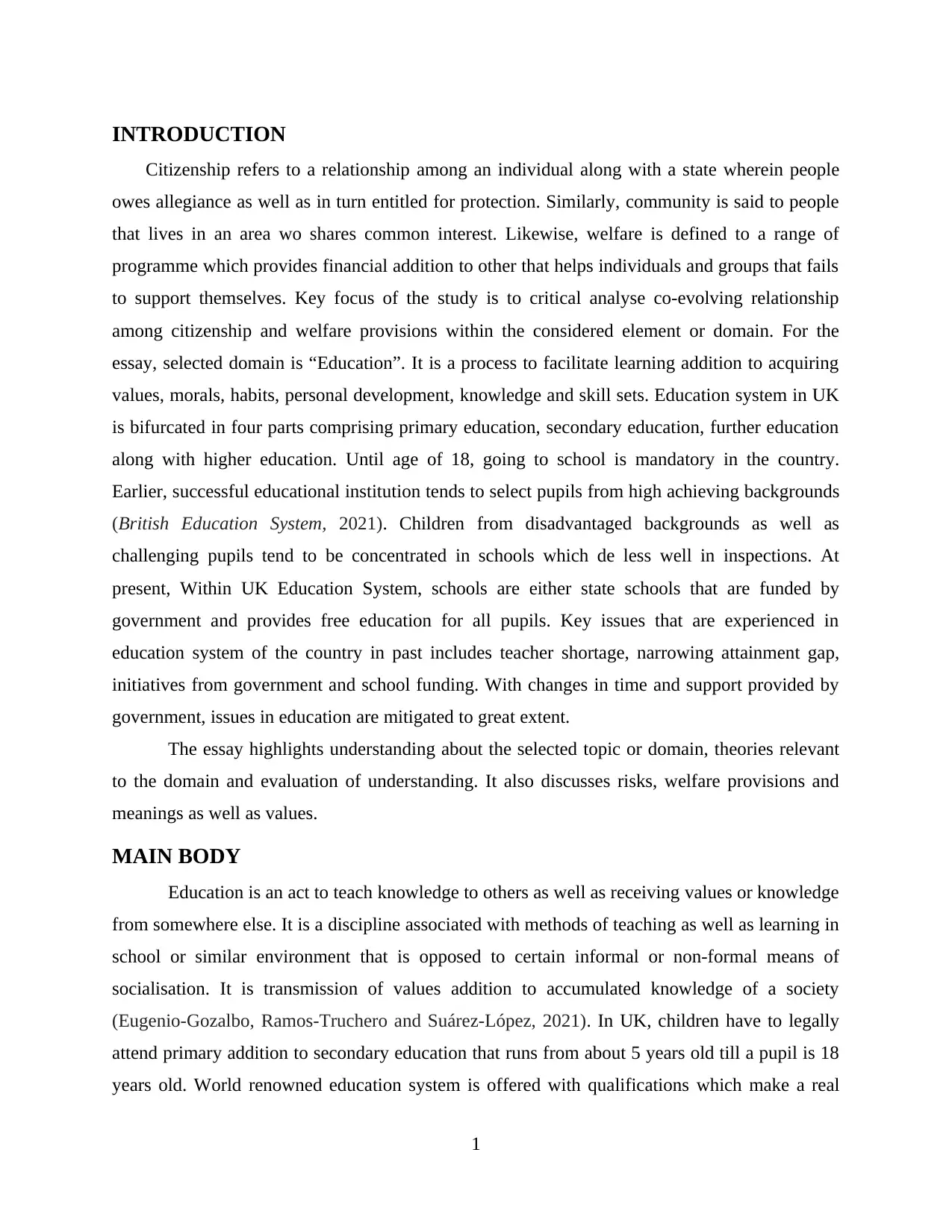
INTRODUCTION
Citizenship refers to a relationship among an individual along with a state wherein people
owes allegiance as well as in turn entitled for protection. Similarly, community is said to people
that lives in an area wo shares common interest. Likewise, welfare is defined to a range of
programme which provides financial addition to other that helps individuals and groups that fails
to support themselves. Key focus of the study is to critical analyse co-evolving relationship
among citizenship and welfare provisions within the considered element or domain. For the
essay, selected domain is “Education”. It is a process to facilitate learning addition to acquiring
values, morals, habits, personal development, knowledge and skill sets. Education system in UK
is bifurcated in four parts comprising primary education, secondary education, further education
along with higher education. Until age of 18, going to school is mandatory in the country.
Earlier, successful educational institution tends to select pupils from high achieving backgrounds
(British Education System, 2021). Children from disadvantaged backgrounds as well as
challenging pupils tend to be concentrated in schools which de less well in inspections. At
present, Within UK Education System, schools are either state schools that are funded by
government and provides free education for all pupils. Key issues that are experienced in
education system of the country in past includes teacher shortage, narrowing attainment gap,
initiatives from government and school funding. With changes in time and support provided by
government, issues in education are mitigated to great extent.
The essay highlights understanding about the selected topic or domain, theories relevant
to the domain and evaluation of understanding. It also discusses risks, welfare provisions and
meanings as well as values.
MAIN BODY
Education is an act to teach knowledge to others as well as receiving values or knowledge
from somewhere else. It is a discipline associated with methods of teaching as well as learning in
school or similar environment that is opposed to certain informal or non-formal means of
socialisation. It is transmission of values addition to accumulated knowledge of a society
(Eugenio-Gozalbo, Ramos-Truchero and Suárez-López, 2021). In UK, children have to legally
attend primary addition to secondary education that runs from about 5 years old till a pupil is 18
years old. World renowned education system is offered with qualifications which make a real
1
Citizenship refers to a relationship among an individual along with a state wherein people
owes allegiance as well as in turn entitled for protection. Similarly, community is said to people
that lives in an area wo shares common interest. Likewise, welfare is defined to a range of
programme which provides financial addition to other that helps individuals and groups that fails
to support themselves. Key focus of the study is to critical analyse co-evolving relationship
among citizenship and welfare provisions within the considered element or domain. For the
essay, selected domain is “Education”. It is a process to facilitate learning addition to acquiring
values, morals, habits, personal development, knowledge and skill sets. Education system in UK
is bifurcated in four parts comprising primary education, secondary education, further education
along with higher education. Until age of 18, going to school is mandatory in the country.
Earlier, successful educational institution tends to select pupils from high achieving backgrounds
(British Education System, 2021). Children from disadvantaged backgrounds as well as
challenging pupils tend to be concentrated in schools which de less well in inspections. At
present, Within UK Education System, schools are either state schools that are funded by
government and provides free education for all pupils. Key issues that are experienced in
education system of the country in past includes teacher shortage, narrowing attainment gap,
initiatives from government and school funding. With changes in time and support provided by
government, issues in education are mitigated to great extent.
The essay highlights understanding about the selected topic or domain, theories relevant
to the domain and evaluation of understanding. It also discusses risks, welfare provisions and
meanings as well as values.
MAIN BODY
Education is an act to teach knowledge to others as well as receiving values or knowledge
from somewhere else. It is a discipline associated with methods of teaching as well as learning in
school or similar environment that is opposed to certain informal or non-formal means of
socialisation. It is transmission of values addition to accumulated knowledge of a society
(Eugenio-Gozalbo, Ramos-Truchero and Suárez-López, 2021). In UK, children have to legally
attend primary addition to secondary education that runs from about 5 years old till a pupil is 18
years old. World renowned education system is offered with qualifications which make a real
1
⊘ This is a preview!⊘
Do you want full access?
Subscribe today to unlock all pages.

Trusted by 1+ million students worldwide
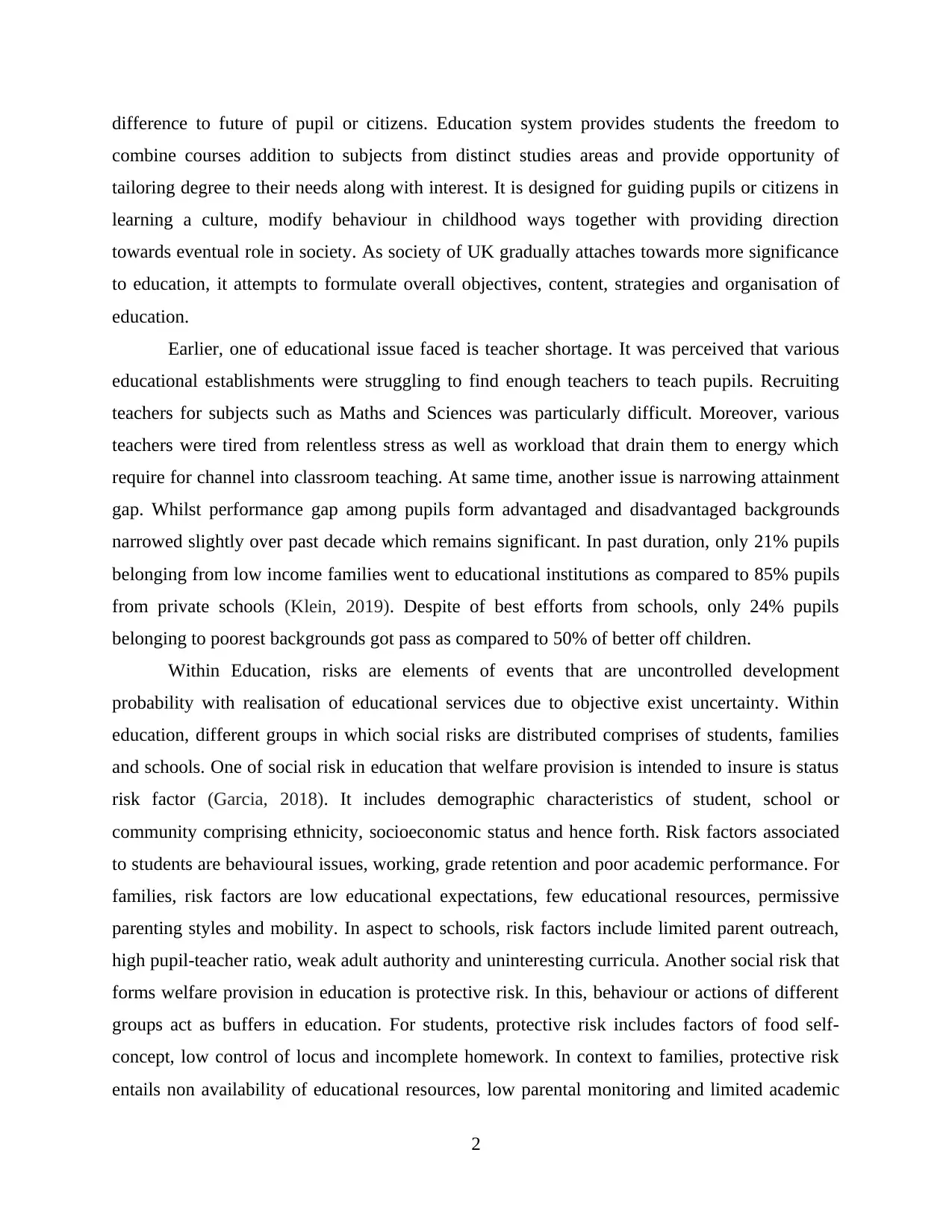
difference to future of pupil or citizens. Education system provides students the freedom to
combine courses addition to subjects from distinct studies areas and provide opportunity of
tailoring degree to their needs along with interest. It is designed for guiding pupils or citizens in
learning a culture, modify behaviour in childhood ways together with providing direction
towards eventual role in society. As society of UK gradually attaches towards more significance
to education, it attempts to formulate overall objectives, content, strategies and organisation of
education.
Earlier, one of educational issue faced is teacher shortage. It was perceived that various
educational establishments were struggling to find enough teachers to teach pupils. Recruiting
teachers for subjects such as Maths and Sciences was particularly difficult. Moreover, various
teachers were tired from relentless stress as well as workload that drain them to energy which
require for channel into classroom teaching. At same time, another issue is narrowing attainment
gap. Whilst performance gap among pupils form advantaged and disadvantaged backgrounds
narrowed slightly over past decade which remains significant. In past duration, only 21% pupils
belonging from low income families went to educational institutions as compared to 85% pupils
from private schools (Klein, 2019). Despite of best efforts from schools, only 24% pupils
belonging to poorest backgrounds got pass as compared to 50% of better off children.
Within Education, risks are elements of events that are uncontrolled development
probability with realisation of educational services due to objective exist uncertainty. Within
education, different groups in which social risks are distributed comprises of students, families
and schools. One of social risk in education that welfare provision is intended to insure is status
risk factor (Garcia, 2018). It includes demographic characteristics of student, school or
community comprising ethnicity, socioeconomic status and hence forth. Risk factors associated
to students are behavioural issues, working, grade retention and poor academic performance. For
families, risk factors are low educational expectations, few educational resources, permissive
parenting styles and mobility. In aspect to schools, risk factors include limited parent outreach,
high pupil-teacher ratio, weak adult authority and uninteresting curricula. Another social risk that
forms welfare provision in education is protective risk. In this, behaviour or actions of different
groups act as buffers in education. For students, protective risk includes factors of food self-
concept, low control of locus and incomplete homework. In context to families, protective risk
entails non availability of educational resources, low parental monitoring and limited academic
2
combine courses addition to subjects from distinct studies areas and provide opportunity of
tailoring degree to their needs along with interest. It is designed for guiding pupils or citizens in
learning a culture, modify behaviour in childhood ways together with providing direction
towards eventual role in society. As society of UK gradually attaches towards more significance
to education, it attempts to formulate overall objectives, content, strategies and organisation of
education.
Earlier, one of educational issue faced is teacher shortage. It was perceived that various
educational establishments were struggling to find enough teachers to teach pupils. Recruiting
teachers for subjects such as Maths and Sciences was particularly difficult. Moreover, various
teachers were tired from relentless stress as well as workload that drain them to energy which
require for channel into classroom teaching. At same time, another issue is narrowing attainment
gap. Whilst performance gap among pupils form advantaged and disadvantaged backgrounds
narrowed slightly over past decade which remains significant. In past duration, only 21% pupils
belonging from low income families went to educational institutions as compared to 85% pupils
from private schools (Klein, 2019). Despite of best efforts from schools, only 24% pupils
belonging to poorest backgrounds got pass as compared to 50% of better off children.
Within Education, risks are elements of events that are uncontrolled development
probability with realisation of educational services due to objective exist uncertainty. Within
education, different groups in which social risks are distributed comprises of students, families
and schools. One of social risk in education that welfare provision is intended to insure is status
risk factor (Garcia, 2018). It includes demographic characteristics of student, school or
community comprising ethnicity, socioeconomic status and hence forth. Risk factors associated
to students are behavioural issues, working, grade retention and poor academic performance. For
families, risk factors are low educational expectations, few educational resources, permissive
parenting styles and mobility. In aspect to schools, risk factors include limited parent outreach,
high pupil-teacher ratio, weak adult authority and uninteresting curricula. Another social risk that
forms welfare provision in education is protective risk. In this, behaviour or actions of different
groups act as buffers in education. For students, protective risk includes factors of food self-
concept, low control of locus and incomplete homework. In context to families, protective risk
entails non availability of educational resources, low parental monitoring and limited academic
2
Paraphrase This Document
Need a fresh take? Get an instant paraphrase of this document with our AI Paraphraser
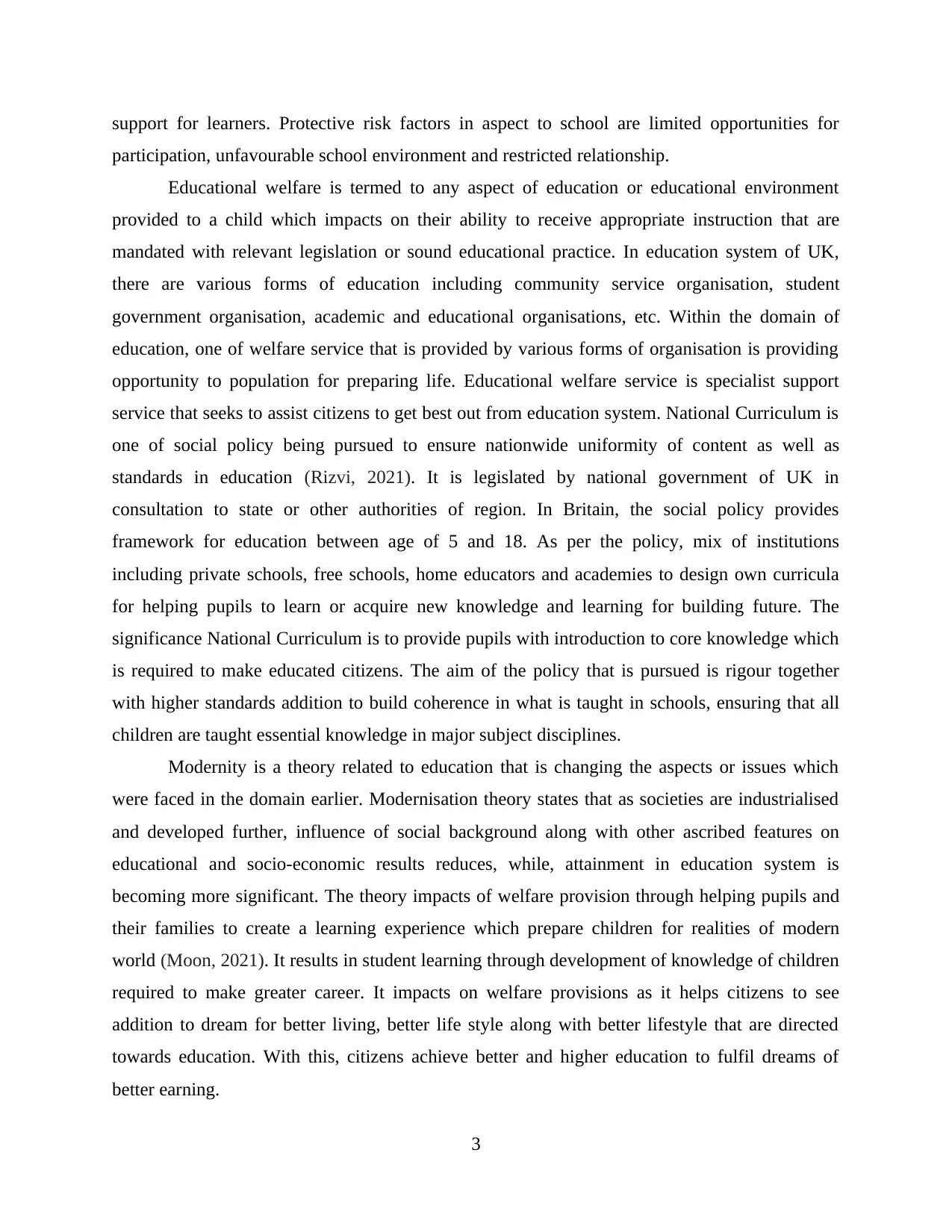
support for learners. Protective risk factors in aspect to school are limited opportunities for
participation, unfavourable school environment and restricted relationship.
Educational welfare is termed to any aspect of education or educational environment
provided to a child which impacts on their ability to receive appropriate instruction that are
mandated with relevant legislation or sound educational practice. In education system of UK,
there are various forms of education including community service organisation, student
government organisation, academic and educational organisations, etc. Within the domain of
education, one of welfare service that is provided by various forms of organisation is providing
opportunity to population for preparing life. Educational welfare service is specialist support
service that seeks to assist citizens to get best out from education system. National Curriculum is
one of social policy being pursued to ensure nationwide uniformity of content as well as
standards in education (Rizvi, 2021). It is legislated by national government of UK in
consultation to state or other authorities of region. In Britain, the social policy provides
framework for education between age of 5 and 18. As per the policy, mix of institutions
including private schools, free schools, home educators and academies to design own curricula
for helping pupils to learn or acquire new knowledge and learning for building future. The
significance National Curriculum is to provide pupils with introduction to core knowledge which
is required to make educated citizens. The aim of the policy that is pursued is rigour together
with higher standards addition to build coherence in what is taught in schools, ensuring that all
children are taught essential knowledge in major subject disciplines.
Modernity is a theory related to education that is changing the aspects or issues which
were faced in the domain earlier. Modernisation theory states that as societies are industrialised
and developed further, influence of social background along with other ascribed features on
educational and socio-economic results reduces, while, attainment in education system is
becoming more significant. The theory impacts of welfare provision through helping pupils and
their families to create a learning experience which prepare children for realities of modern
world (Moon, 2021). It results in student learning through development of knowledge of children
required to make greater career. It impacts on welfare provisions as it helps citizens to see
addition to dream for better living, better life style along with better lifestyle that are directed
towards education. With this, citizens achieve better and higher education to fulfil dreams of
better earning.
3
participation, unfavourable school environment and restricted relationship.
Educational welfare is termed to any aspect of education or educational environment
provided to a child which impacts on their ability to receive appropriate instruction that are
mandated with relevant legislation or sound educational practice. In education system of UK,
there are various forms of education including community service organisation, student
government organisation, academic and educational organisations, etc. Within the domain of
education, one of welfare service that is provided by various forms of organisation is providing
opportunity to population for preparing life. Educational welfare service is specialist support
service that seeks to assist citizens to get best out from education system. National Curriculum is
one of social policy being pursued to ensure nationwide uniformity of content as well as
standards in education (Rizvi, 2021). It is legislated by national government of UK in
consultation to state or other authorities of region. In Britain, the social policy provides
framework for education between age of 5 and 18. As per the policy, mix of institutions
including private schools, free schools, home educators and academies to design own curricula
for helping pupils to learn or acquire new knowledge and learning for building future. The
significance National Curriculum is to provide pupils with introduction to core knowledge which
is required to make educated citizens. The aim of the policy that is pursued is rigour together
with higher standards addition to build coherence in what is taught in schools, ensuring that all
children are taught essential knowledge in major subject disciplines.
Modernity is a theory related to education that is changing the aspects or issues which
were faced in the domain earlier. Modernisation theory states that as societies are industrialised
and developed further, influence of social background along with other ascribed features on
educational and socio-economic results reduces, while, attainment in education system is
becoming more significant. The theory impacts of welfare provision through helping pupils and
their families to create a learning experience which prepare children for realities of modern
world (Moon, 2021). It results in student learning through development of knowledge of children
required to make greater career. It impacts on welfare provisions as it helps citizens to see
addition to dream for better living, better life style along with better lifestyle that are directed
towards education. With this, citizens achieve better and higher education to fulfil dreams of
better earning.
3
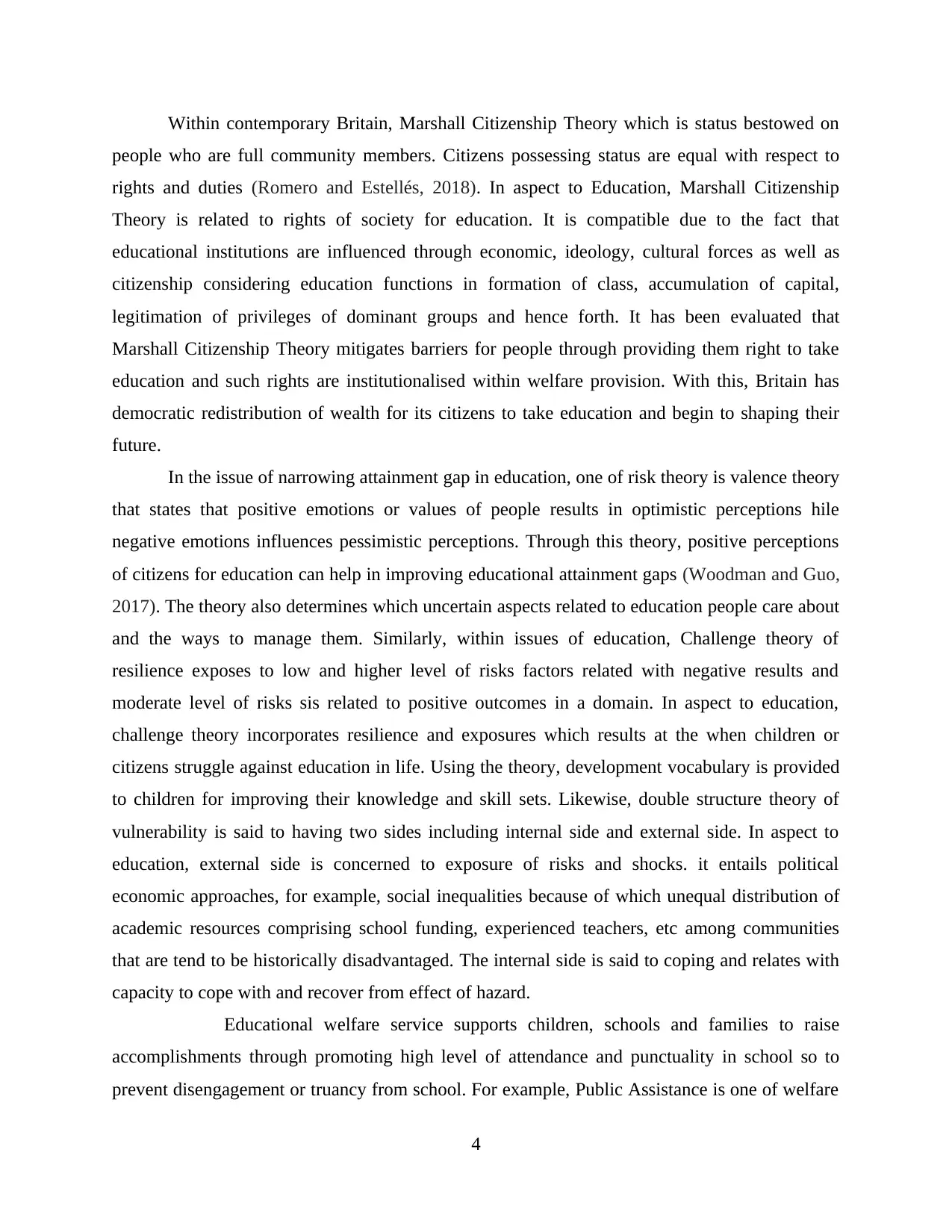
Within contemporary Britain, Marshall Citizenship Theory which is status bestowed on
people who are full community members. Citizens possessing status are equal with respect to
rights and duties (Romero and Estellés, 2018). In aspect to Education, Marshall Citizenship
Theory is related to rights of society for education. It is compatible due to the fact that
educational institutions are influenced through economic, ideology, cultural forces as well as
citizenship considering education functions in formation of class, accumulation of capital,
legitimation of privileges of dominant groups and hence forth. It has been evaluated that
Marshall Citizenship Theory mitigates barriers for people through providing them right to take
education and such rights are institutionalised within welfare provision. With this, Britain has
democratic redistribution of wealth for its citizens to take education and begin to shaping their
future.
In the issue of narrowing attainment gap in education, one of risk theory is valence theory
that states that positive emotions or values of people results in optimistic perceptions hile
negative emotions influences pessimistic perceptions. Through this theory, positive perceptions
of citizens for education can help in improving educational attainment gaps (Woodman and Guo,
2017). The theory also determines which uncertain aspects related to education people care about
and the ways to manage them. Similarly, within issues of education, Challenge theory of
resilience exposes to low and higher level of risks factors related with negative results and
moderate level of risks sis related to positive outcomes in a domain. In aspect to education,
challenge theory incorporates resilience and exposures which results at the when children or
citizens struggle against education in life. Using the theory, development vocabulary is provided
to children for improving their knowledge and skill sets. Likewise, double structure theory of
vulnerability is said to having two sides including internal side and external side. In aspect to
education, external side is concerned to exposure of risks and shocks. it entails political
economic approaches, for example, social inequalities because of which unequal distribution of
academic resources comprising school funding, experienced teachers, etc among communities
that are tend to be historically disadvantaged. The internal side is said to coping and relates with
capacity to cope with and recover from effect of hazard.
Educational welfare service supports children, schools and families to raise
accomplishments through promoting high level of attendance and punctuality in school so to
prevent disengagement or truancy from school. For example, Public Assistance is one of welfare
4
people who are full community members. Citizens possessing status are equal with respect to
rights and duties (Romero and Estellés, 2018). In aspect to Education, Marshall Citizenship
Theory is related to rights of society for education. It is compatible due to the fact that
educational institutions are influenced through economic, ideology, cultural forces as well as
citizenship considering education functions in formation of class, accumulation of capital,
legitimation of privileges of dominant groups and hence forth. It has been evaluated that
Marshall Citizenship Theory mitigates barriers for people through providing them right to take
education and such rights are institutionalised within welfare provision. With this, Britain has
democratic redistribution of wealth for its citizens to take education and begin to shaping their
future.
In the issue of narrowing attainment gap in education, one of risk theory is valence theory
that states that positive emotions or values of people results in optimistic perceptions hile
negative emotions influences pessimistic perceptions. Through this theory, positive perceptions
of citizens for education can help in improving educational attainment gaps (Woodman and Guo,
2017). The theory also determines which uncertain aspects related to education people care about
and the ways to manage them. Similarly, within issues of education, Challenge theory of
resilience exposes to low and higher level of risks factors related with negative results and
moderate level of risks sis related to positive outcomes in a domain. In aspect to education,
challenge theory incorporates resilience and exposures which results at the when children or
citizens struggle against education in life. Using the theory, development vocabulary is provided
to children for improving their knowledge and skill sets. Likewise, double structure theory of
vulnerability is said to having two sides including internal side and external side. In aspect to
education, external side is concerned to exposure of risks and shocks. it entails political
economic approaches, for example, social inequalities because of which unequal distribution of
academic resources comprising school funding, experienced teachers, etc among communities
that are tend to be historically disadvantaged. The internal side is said to coping and relates with
capacity to cope with and recover from effect of hazard.
Educational welfare service supports children, schools and families to raise
accomplishments through promoting high level of attendance and punctuality in school so to
prevent disengagement or truancy from school. For example, Public Assistance is one of welfare
4
⊘ This is a preview!⊘
Do you want full access?
Subscribe today to unlock all pages.

Trusted by 1+ million students worldwide
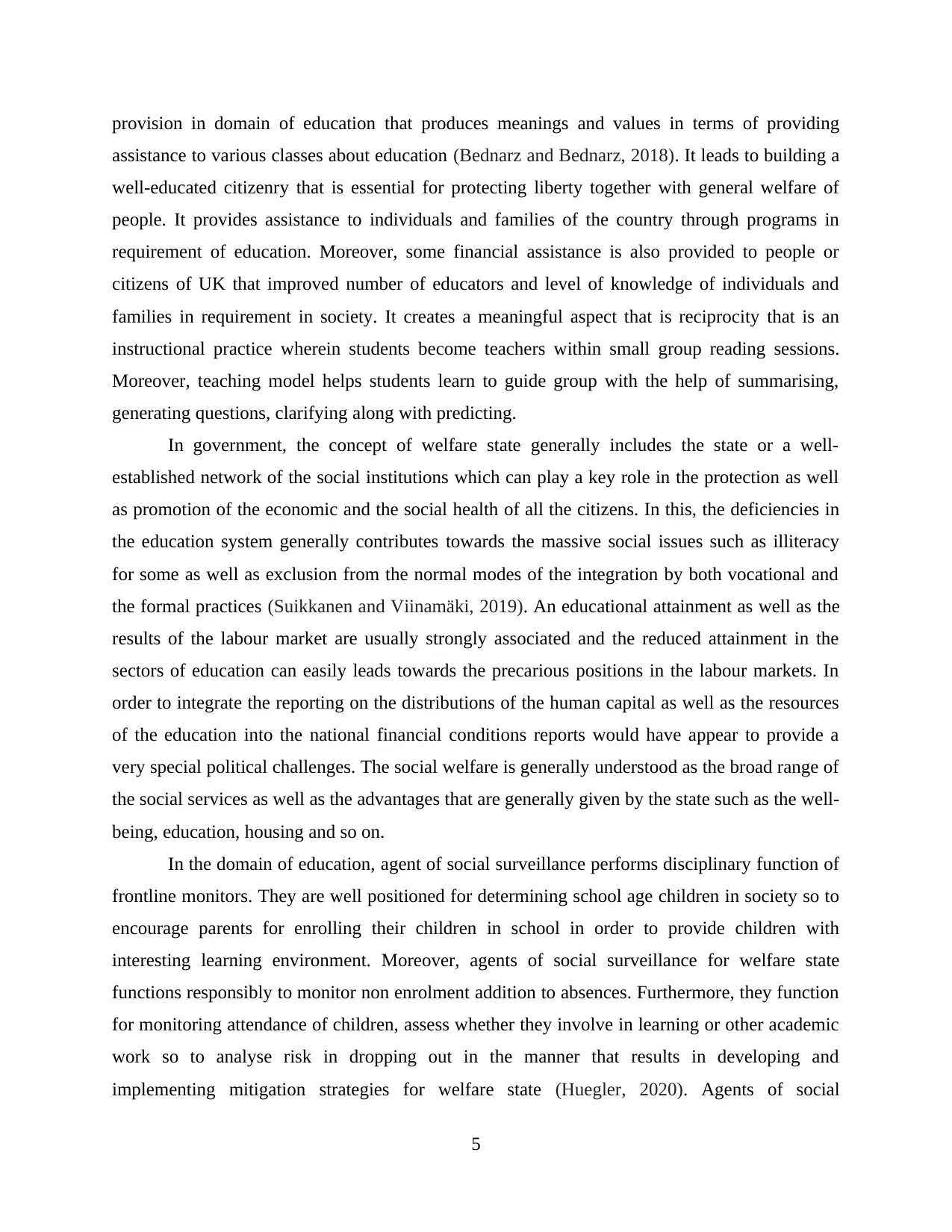
provision in domain of education that produces meanings and values in terms of providing
assistance to various classes about education (Bednarz and Bednarz, 2018). It leads to building a
well-educated citizenry that is essential for protecting liberty together with general welfare of
people. It provides assistance to individuals and families of the country through programs in
requirement of education. Moreover, some financial assistance is also provided to people or
citizens of UK that improved number of educators and level of knowledge of individuals and
families in requirement in society. It creates a meaningful aspect that is reciprocity that is an
instructional practice wherein students become teachers within small group reading sessions.
Moreover, teaching model helps students learn to guide group with the help of summarising,
generating questions, clarifying along with predicting.
In government, the concept of welfare state generally includes the state or a well-
established network of the social institutions which can play a key role in the protection as well
as promotion of the economic and the social health of all the citizens. In this, the deficiencies in
the education system generally contributes towards the massive social issues such as illiteracy
for some as well as exclusion from the normal modes of the integration by both vocational and
the formal practices (Suikkanen and Viinamäki, 2019). An educational attainment as well as the
results of the labour market are usually strongly associated and the reduced attainment in the
sectors of education can easily leads towards the precarious positions in the labour markets. In
order to integrate the reporting on the distributions of the human capital as well as the resources
of the education into the national financial conditions reports would have appear to provide a
very special political challenges. The social welfare is generally understood as the broad range of
the social services as well as the advantages that are generally given by the state such as the well-
being, education, housing and so on.
In the domain of education, agent of social surveillance performs disciplinary function of
frontline monitors. They are well positioned for determining school age children in society so to
encourage parents for enrolling their children in school in order to provide children with
interesting learning environment. Moreover, agents of social surveillance for welfare state
functions responsibly to monitor non enrolment addition to absences. Furthermore, they function
for monitoring attendance of children, assess whether they involve in learning or other academic
work so to analyse risk in dropping out in the manner that results in developing and
implementing mitigation strategies for welfare state (Huegler, 2020). Agents of social
5
assistance to various classes about education (Bednarz and Bednarz, 2018). It leads to building a
well-educated citizenry that is essential for protecting liberty together with general welfare of
people. It provides assistance to individuals and families of the country through programs in
requirement of education. Moreover, some financial assistance is also provided to people or
citizens of UK that improved number of educators and level of knowledge of individuals and
families in requirement in society. It creates a meaningful aspect that is reciprocity that is an
instructional practice wherein students become teachers within small group reading sessions.
Moreover, teaching model helps students learn to guide group with the help of summarising,
generating questions, clarifying along with predicting.
In government, the concept of welfare state generally includes the state or a well-
established network of the social institutions which can play a key role in the protection as well
as promotion of the economic and the social health of all the citizens. In this, the deficiencies in
the education system generally contributes towards the massive social issues such as illiteracy
for some as well as exclusion from the normal modes of the integration by both vocational and
the formal practices (Suikkanen and Viinamäki, 2019). An educational attainment as well as the
results of the labour market are usually strongly associated and the reduced attainment in the
sectors of education can easily leads towards the precarious positions in the labour markets. In
order to integrate the reporting on the distributions of the human capital as well as the resources
of the education into the national financial conditions reports would have appear to provide a
very special political challenges. The social welfare is generally understood as the broad range of
the social services as well as the advantages that are generally given by the state such as the well-
being, education, housing and so on.
In the domain of education, agent of social surveillance performs disciplinary function of
frontline monitors. They are well positioned for determining school age children in society so to
encourage parents for enrolling their children in school in order to provide children with
interesting learning environment. Moreover, agents of social surveillance for welfare state
functions responsibly to monitor non enrolment addition to absences. Furthermore, they function
for monitoring attendance of children, assess whether they involve in learning or other academic
work so to analyse risk in dropping out in the manner that results in developing and
implementing mitigation strategies for welfare state (Huegler, 2020). Agents of social
5
Paraphrase This Document
Need a fresh take? Get an instant paraphrase of this document with our AI Paraphraser
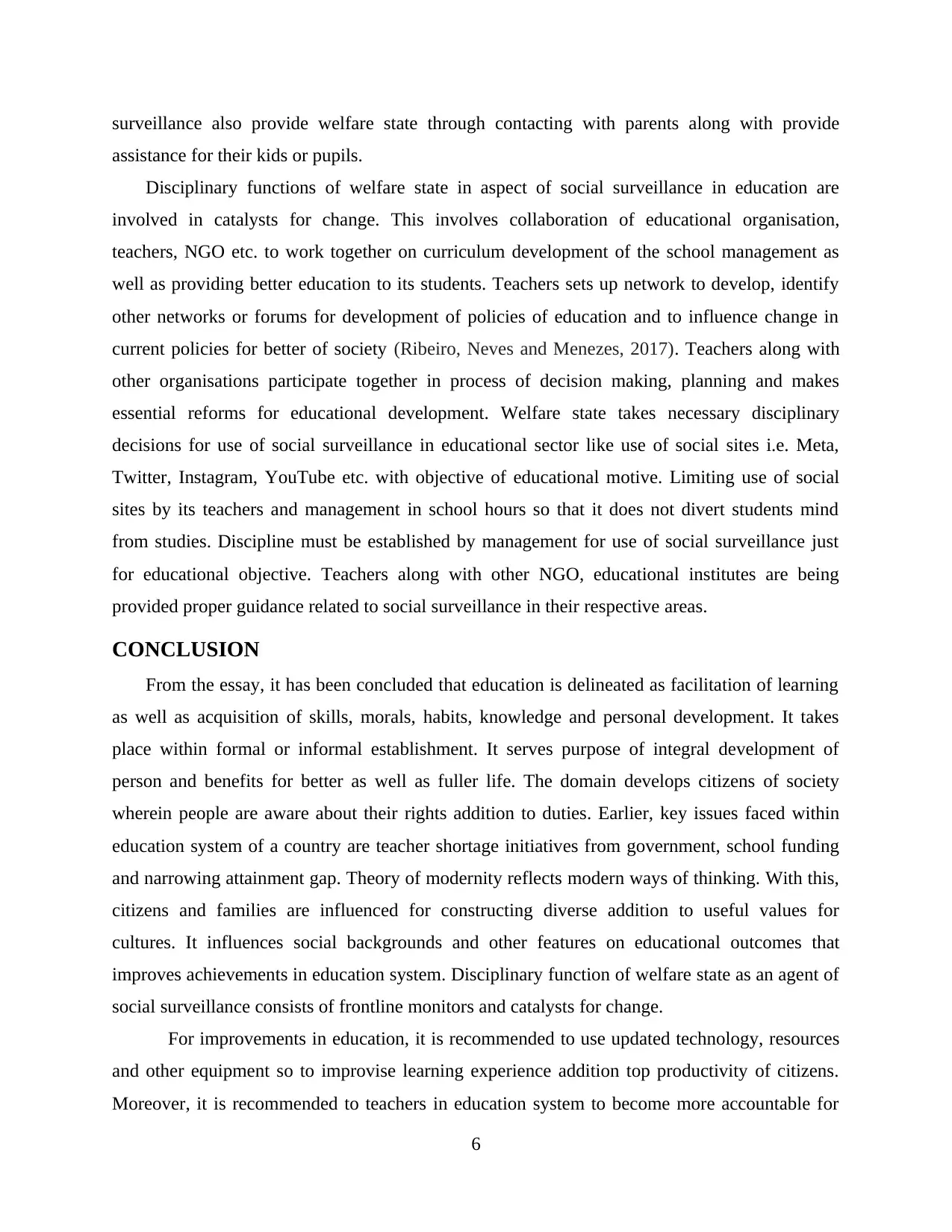
surveillance also provide welfare state through contacting with parents along with provide
assistance for their kids or pupils.
Disciplinary functions of welfare state in aspect of social surveillance in education are
involved in catalysts for change. This involves collaboration of educational organisation,
teachers, NGO etc. to work together on curriculum development of the school management as
well as providing better education to its students. Teachers sets up network to develop, identify
other networks or forums for development of policies of education and to influence change in
current policies for better of society (Ribeiro, Neves and Menezes, 2017). Teachers along with
other organisations participate together in process of decision making, planning and makes
essential reforms for educational development. Welfare state takes necessary disciplinary
decisions for use of social surveillance in educational sector like use of social sites i.e. Meta,
Twitter, Instagram, YouTube etc. with objective of educational motive. Limiting use of social
sites by its teachers and management in school hours so that it does not divert students mind
from studies. Discipline must be established by management for use of social surveillance just
for educational objective. Teachers along with other NGO, educational institutes are being
provided proper guidance related to social surveillance in their respective areas.
CONCLUSION
From the essay, it has been concluded that education is delineated as facilitation of learning
as well as acquisition of skills, morals, habits, knowledge and personal development. It takes
place within formal or informal establishment. It serves purpose of integral development of
person and benefits for better as well as fuller life. The domain develops citizens of society
wherein people are aware about their rights addition to duties. Earlier, key issues faced within
education system of a country are teacher shortage initiatives from government, school funding
and narrowing attainment gap. Theory of modernity reflects modern ways of thinking. With this,
citizens and families are influenced for constructing diverse addition to useful values for
cultures. It influences social backgrounds and other features on educational outcomes that
improves achievements in education system. Disciplinary function of welfare state as an agent of
social surveillance consists of frontline monitors and catalysts for change.
For improvements in education, it is recommended to use updated technology, resources
and other equipment so to improvise learning experience addition top productivity of citizens.
Moreover, it is recommended to teachers in education system to become more accountable for
6
assistance for their kids or pupils.
Disciplinary functions of welfare state in aspect of social surveillance in education are
involved in catalysts for change. This involves collaboration of educational organisation,
teachers, NGO etc. to work together on curriculum development of the school management as
well as providing better education to its students. Teachers sets up network to develop, identify
other networks or forums for development of policies of education and to influence change in
current policies for better of society (Ribeiro, Neves and Menezes, 2017). Teachers along with
other organisations participate together in process of decision making, planning and makes
essential reforms for educational development. Welfare state takes necessary disciplinary
decisions for use of social surveillance in educational sector like use of social sites i.e. Meta,
Twitter, Instagram, YouTube etc. with objective of educational motive. Limiting use of social
sites by its teachers and management in school hours so that it does not divert students mind
from studies. Discipline must be established by management for use of social surveillance just
for educational objective. Teachers along with other NGO, educational institutes are being
provided proper guidance related to social surveillance in their respective areas.
CONCLUSION
From the essay, it has been concluded that education is delineated as facilitation of learning
as well as acquisition of skills, morals, habits, knowledge and personal development. It takes
place within formal or informal establishment. It serves purpose of integral development of
person and benefits for better as well as fuller life. The domain develops citizens of society
wherein people are aware about their rights addition to duties. Earlier, key issues faced within
education system of a country are teacher shortage initiatives from government, school funding
and narrowing attainment gap. Theory of modernity reflects modern ways of thinking. With this,
citizens and families are influenced for constructing diverse addition to useful values for
cultures. It influences social backgrounds and other features on educational outcomes that
improves achievements in education system. Disciplinary function of welfare state as an agent of
social surveillance consists of frontline monitors and catalysts for change.
For improvements in education, it is recommended to use updated technology, resources
and other equipment so to improvise learning experience addition top productivity of citizens.
Moreover, it is recommended to teachers in education system to become more accountable for
6
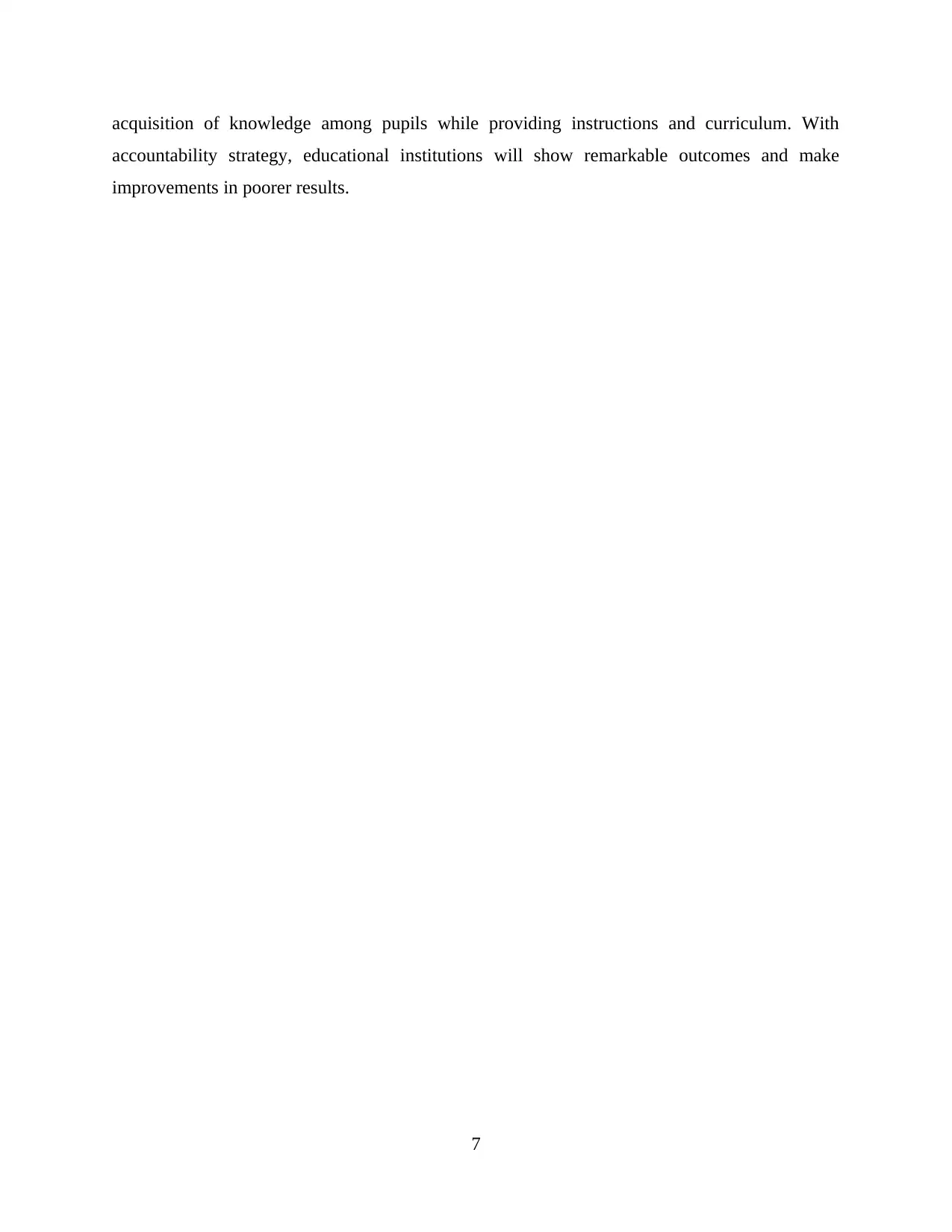
acquisition of knowledge among pupils while providing instructions and curriculum. With
accountability strategy, educational institutions will show remarkable outcomes and make
improvements in poorer results.
7
accountability strategy, educational institutions will show remarkable outcomes and make
improvements in poorer results.
7
⊘ This is a preview!⊘
Do you want full access?
Subscribe today to unlock all pages.

Trusted by 1+ million students worldwide
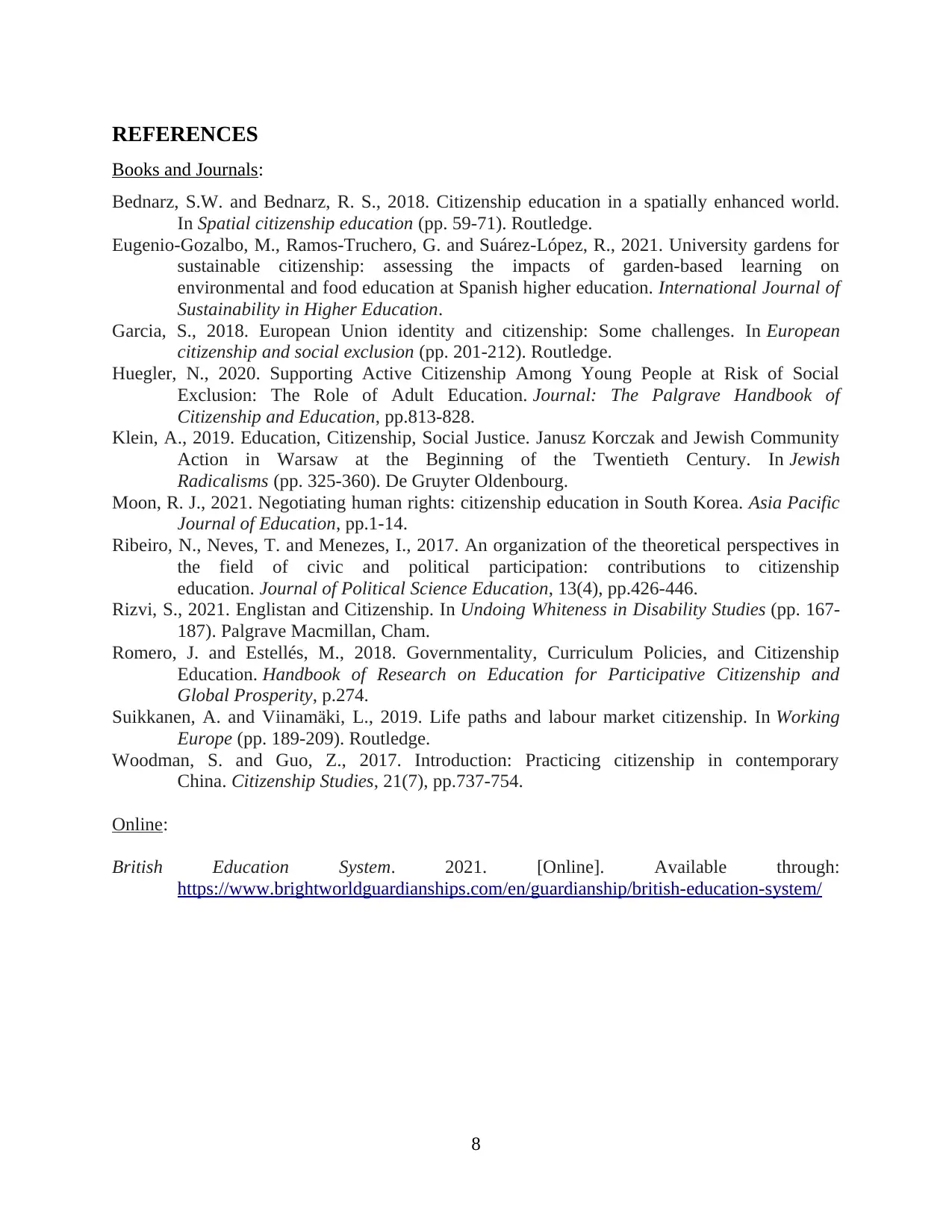
REFERENCES
Books and Journals:
Bednarz, S.W. and Bednarz, R. S., 2018. Citizenship education in a spatially enhanced world.
In Spatial citizenship education (pp. 59-71). Routledge.
Eugenio-Gozalbo, M., Ramos-Truchero, G. and Suárez-López, R., 2021. University gardens for
sustainable citizenship: assessing the impacts of garden-based learning on
environmental and food education at Spanish higher education. International Journal of
Sustainability in Higher Education.
Garcia, S., 2018. European Union identity and citizenship: Some challenges. In European
citizenship and social exclusion (pp. 201-212). Routledge.
Huegler, N., 2020. Supporting Active Citizenship Among Young People at Risk of Social
Exclusion: The Role of Adult Education. Journal: The Palgrave Handbook of
Citizenship and Education, pp.813-828.
Klein, A., 2019. Education, Citizenship, Social Justice. Janusz Korczak and Jewish Community
Action in Warsaw at the Beginning of the Twentieth Century. In Jewish
Radicalisms (pp. 325-360). De Gruyter Oldenbourg.
Moon, R. J., 2021. Negotiating human rights: citizenship education in South Korea. Asia Pacific
Journal of Education, pp.1-14.
Ribeiro, N., Neves, T. and Menezes, I., 2017. An organization of the theoretical perspectives in
the field of civic and political participation: contributions to citizenship
education. Journal of Political Science Education, 13(4), pp.426-446.
Rizvi, S., 2021. Englistan and Citizenship. In Undoing Whiteness in Disability Studies (pp. 167-
187). Palgrave Macmillan, Cham.
Romero, J. and Estellés, M., 2018. Governmentality, Curriculum Policies, and Citizenship
Education. Handbook of Research on Education for Participative Citizenship and
Global Prosperity, p.274.
Suikkanen, A. and Viinamäki, L., 2019. Life paths and labour market citizenship. In Working
Europe (pp. 189-209). Routledge.
Woodman, S. and Guo, Z., 2017. Introduction: Practicing citizenship in contemporary
China. Citizenship Studies, 21(7), pp.737-754.
Online:
British Education System. 2021. [Online]. Available through:
https://www.brightworldguardianships.com/en/guardianship/british-education-system/
8
Books and Journals:
Bednarz, S.W. and Bednarz, R. S., 2018. Citizenship education in a spatially enhanced world.
In Spatial citizenship education (pp. 59-71). Routledge.
Eugenio-Gozalbo, M., Ramos-Truchero, G. and Suárez-López, R., 2021. University gardens for
sustainable citizenship: assessing the impacts of garden-based learning on
environmental and food education at Spanish higher education. International Journal of
Sustainability in Higher Education.
Garcia, S., 2018. European Union identity and citizenship: Some challenges. In European
citizenship and social exclusion (pp. 201-212). Routledge.
Huegler, N., 2020. Supporting Active Citizenship Among Young People at Risk of Social
Exclusion: The Role of Adult Education. Journal: The Palgrave Handbook of
Citizenship and Education, pp.813-828.
Klein, A., 2019. Education, Citizenship, Social Justice. Janusz Korczak and Jewish Community
Action in Warsaw at the Beginning of the Twentieth Century. In Jewish
Radicalisms (pp. 325-360). De Gruyter Oldenbourg.
Moon, R. J., 2021. Negotiating human rights: citizenship education in South Korea. Asia Pacific
Journal of Education, pp.1-14.
Ribeiro, N., Neves, T. and Menezes, I., 2017. An organization of the theoretical perspectives in
the field of civic and political participation: contributions to citizenship
education. Journal of Political Science Education, 13(4), pp.426-446.
Rizvi, S., 2021. Englistan and Citizenship. In Undoing Whiteness in Disability Studies (pp. 167-
187). Palgrave Macmillan, Cham.
Romero, J. and Estellés, M., 2018. Governmentality, Curriculum Policies, and Citizenship
Education. Handbook of Research on Education for Participative Citizenship and
Global Prosperity, p.274.
Suikkanen, A. and Viinamäki, L., 2019. Life paths and labour market citizenship. In Working
Europe (pp. 189-209). Routledge.
Woodman, S. and Guo, Z., 2017. Introduction: Practicing citizenship in contemporary
China. Citizenship Studies, 21(7), pp.737-754.
Online:
British Education System. 2021. [Online]. Available through:
https://www.brightworldguardianships.com/en/guardianship/british-education-system/
8
1 out of 10
Related Documents
Your All-in-One AI-Powered Toolkit for Academic Success.
+13062052269
info@desklib.com
Available 24*7 on WhatsApp / Email
![[object Object]](/_next/static/media/star-bottom.7253800d.svg)
Unlock your academic potential
Copyright © 2020–2026 A2Z Services. All Rights Reserved. Developed and managed by ZUCOL.





